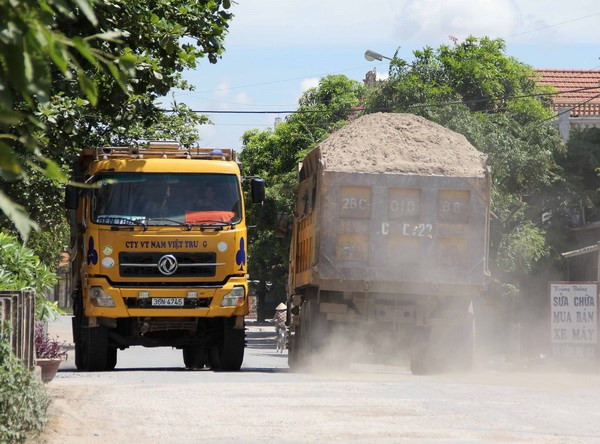 Environment
Environment

 |
| Construction material transport vehicles contribute to environmental pollution in Hà Nội. — VNA/VNS Photos |
HÀ NỘI — Deputy Prime Minister Trần Hồng Hà has called for urgent and decisive action to combat worsening air pollution in major cities, particularly Hà Nội and HCM City.
Chairing a conference on Thursday, he emphasised the severity of the crisis, urging ministries, local authorities and relevant agencies to implement concrete solutions with clear accountability and a defined timeline.
Deputy PM Hà warned that air quality in major cities, especially Hà Nội, has reached alarming levels. This issue has been a priority for Party and State leaders, who have repeatedly directed authorities to implement urgent measures.
While the Environmental Protection Law 2020 outlines clear responsibilities for State agencies, local governments, businesses and individuals, enforcement remains weak.
“We have laws and directives, but without decisive action, the situation will not improve,” the Deputy PM said.
He said that the meeting was not merely a theoretical discussion but a working session aimed at finding immediate, practical solutions.
"We have no time to waste. We must see actual improvements in air quality this year, not wait until 2030."
Regarding local authorities, particularly in Hà Nội and HCM City, the Deputy PM requested that they provide a detailed report on air pollution in their respective cities, identifying the main causes, clarifying the responsibilities of relevant agencies, and outlining specific measures to be implemented immediately.
The Government would provide maximum support to localities in implementing air pollution mitigation measures while also closely monitoring and supervising the progress of these solutions, Deputy PM Hà noted.
Pollution sources identified
Deputy Minister of Agriculture and Environment Lê Công Thành reported that pollution has intensified in the northern region surrounding Hà Nội and the southern region around HCM City.
Key pollutants include road dust, PM10 and PM2.5 fine particulate matter, with pollution levels peaking during the winter-spring months from October to April.
Hà Nội faces worse pollution than HCM City due to unfavourable weather conditions, especially at year-end and during the Lunar New Year, when industrial activity and traffic increase significantly.
Four main causes were identified in the report.
Traffic emissions, including road dust and exhaust from outdated vehicles, diesel-powered trucks and construction material transport, were cited as a leading contributor.
Industrial activity, particularly emissions from cement factories, coal-fired power plants and steel manufacturing, was also a major factor.
Construction dust from uncontrolled urban development and inadequate dust suppression measures further worsened air quality.
Open burning, such as waste disposal, post-harvest straw burning, biomass used for heating, street food grilling and ritual paper burning, was also highlighted as a significant source of pollution.
Hà Nội’s geographical location and climate – surrounded by mountains and affected by high humidity, low rainfall and frequent temperature inversions – tend to retain pollutants in the air around the city.
 |
| High-rise buildings in HCM City are enveloped in dense haze as fine dust levels repeatedly surpass safe limits. |
In response to the worsening air pollution, representatives from the environmental management authority have urged provinces and cities, especially major urban areas, to tighten regulations on construction activities.
Authorities must closely monitor urban developments, high-rise buildings, transport infrastructure, public works and pavement renovations. Stricter enforcement of dust control measures, including mandatory dust shielding and water spraying, is essential to reducing pollution.
Traffic management measures should include regulating truck routes, restricting outdated vehicles and expanding public transport.
Urban sanitation efforts must be enhanced through increased street cleaning and the installation of misting systems on key roads.
A complete ban on open burning is necessary, with stronger enforcement against waste and agricultural residue burning.
Recycling should be promoted, and local authorities must be held accountable for violations. Industrial emissions must also be strictly controlled, with automated monitoring of factory output and harsher penalties for non-compliance.
Public awareness campaigns will play a crucial role in tackling air pollution. Authorities aim to educate communities on the health risks and encourage both individuals and organisations to take action.
The conference also reviewed reports from ministries and high-risk localities, laying the foundation for urgent and coordinated measures to address air pollution. — VNS